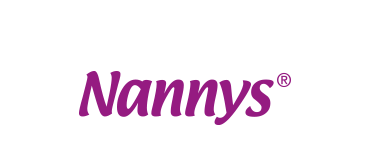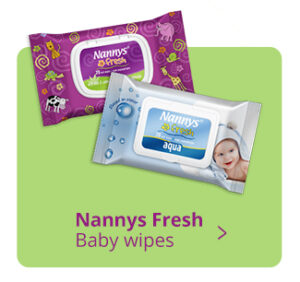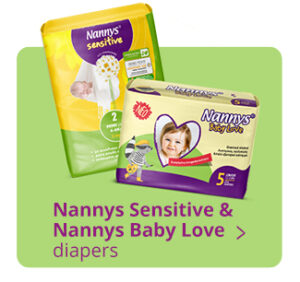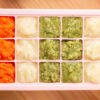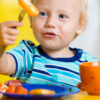For several years, solid foods were introduced early in the infant’s diet. What is the science on introducing solid foods to infants today? Numerous studies have shown that it is not good practice to introduce solid foods before the 4th month of life. Before this age, the gastrointestinal and urinary systems are not mature enough to receive solid foods.
When is a baby ready to start solid food?
To get your baby started on solid foods make sure the following are true:
When your baby fails to eat, do not panic or push. Try again in a few days.
What kind of solid food will I give my baby?
One way to start solid foods for your baby is to give rice flour or oatmeal for a morning meal (we mean the second meal of the day given around 10 in the morning). It may be difficult to swallow at first, don’t be disappointed, try again in a few days. Then, usually 7-10 days later, replace your lunch with vegetable soup. Use potato as the main ingredient of the soup. First add carrot, zucchini or peas and then add vegetables of different kinds. Prefer to give a new vegetable every 3-4 days so that you can detect any allergic reaction.
Do not add salt to baby food in the first year of life because the kidneys are not yet mature enough to excrete excess salt. When you replace lunch, you will also replace the afternoon meal with fruit cream. Around 6-6.5 months add the meat. For meat you can use beef, chicken or turkey. In between meals you can give fruits such as banana, apple, pear, peach. Then you can add the egg yolk (around 6.5 months). Gradually you can add legumes, rice, spaghetti, farin lacte. In general, avoid salt and honey in the first year of life.
An example of an ideal diet for a 7-month old baby
Morning: Milk
10:00am meal: Cream or egg
Lunch: Meat and vegetable soup or vegetable soup
Afternoon: Fruit cream
Evening: Milk
Give water after meals.

Can I give ready meals and baby cereal to my baby?
The modern way of life with parents working long hours sometimes leaves them with no time to prepare food for the baby in advance.* In these cases, ready meals or baby cereal are great options for your baby if you follow the proper rules of food preservation. When feeding your baby, put the amount you plan to consume in a separate cup. Do not feed your baby from the packaging container if you are going to store some amount because the germs that are transferred from the baby’s mouth remain in the cup and multiply.
In general, ready meals are checked by the responsible authorities for the suitability of their ingredients and the correct proportion. For example, some foods may contain nitrites that may be toxic to the human body but are usually tested in ready-made foods.

